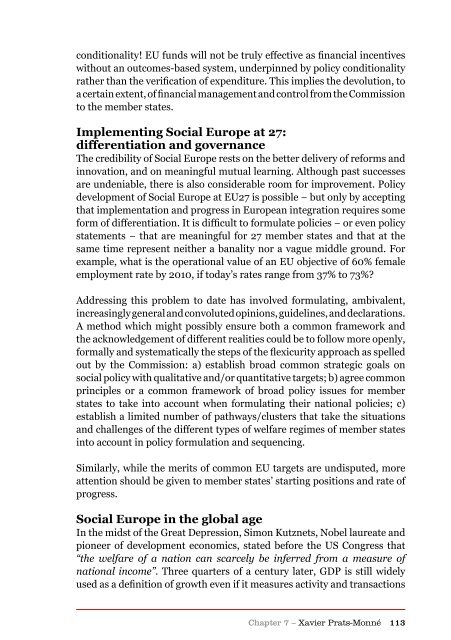Authors Iain Begg | Gabriel Glöckler | Anke Hassel ... - The Europaeum
Authors Iain Begg | Gabriel Glöckler | Anke Hassel ... - The Europaeum
Authors Iain Begg | Gabriel Glöckler | Anke Hassel ... - The Europaeum
You also want an ePaper? Increase the reach of your titles
YUMPU automatically turns print PDFs into web optimized ePapers that Google loves.
conditionality! EU funds will not be truly effective as financial incentives<br />
without an outcomes-based system, underpinned by policy conditionality<br />
rather than the verification of expenditure. This implies the devolution, to<br />
a certain extent, of financial management and control from the Commission<br />
to the member states.<br />
Implementing Social Europe at 27:<br />
differentiation and governance<br />
<strong>The</strong> credibility of Social Europe rests on the better delivery of reforms and<br />
innovation, and on meaningful mutual learning. Although past successes<br />
are undeniable, there is also considerable room for improvement. Policy<br />
development of Social Europe at EU27 is possible − but only by accepting<br />
that implementation and progress in European integration requires some<br />
form of differentiation. It is difficult to formulate policies − or even policy<br />
statements − that are meaningful for 27 member states and that at the<br />
same time represent neither a banality nor a vague middle ground. For<br />
example, what is the operational value of an EU objective of 60% female<br />
employment rate by 2010, if today’s rates range from 37% to 73%?<br />
Addressing this problem to date has involved formulating, ambivalent,<br />
increasingly general and convoluted opinions, guidelines, and declarations.<br />
A method which might possibly ensure both a common framework and<br />
the acknowledgement of different realities could be to follow more openly,<br />
formally and systematically the steps of the flexicurity approach as spelled<br />
out by the Commission: a) establish broad common strategic goals on<br />
social policy with qualitative and/or quantitative targets; b) agree common<br />
principles or a common framework of broad policy issues for member<br />
states to take into account when formulating their national policies; c)<br />
establish a limited number of pathways/clusters that take the situations<br />
and challenges of the different types of welfare regimes of member states<br />
into account in policy formulation and sequencing.<br />
Similarly, while the merits of common EU targets are undisputed, more<br />
attention should be given to member states’ starting positions and rate of<br />
progress.<br />
Social Europe in the global age<br />
In the midst of the Great Depression, Simon Kutznets, Nobel laureate and<br />
pioneer of development economics, stated before the US Congress that<br />
“the welfare of a nation can scarcely be inferred from a measure of<br />
national income”. Three quarters of a century later, GDP is still widely<br />
used as a definition of growth even if it measures activity and transactions<br />
Chapter 7 – Xavier Prats-Monné 113

















